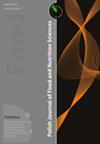β-Glucan and Aronia (Aronia melanocarpa) Phenolics: Interactions During In Vitro Simulated Gastrointestinal Digestion and Adsorption
IF 2.3
4区 农林科学
Q3 FOOD SCIENCE & TECHNOLOGY
引用次数: 0
Abstract
Interactions between phenolics and dietary fibers, such as β -glucan, are important for the bioactivities of phenolics. However, interactions between aronia phenolics and β -glucan in the digestion process, both promoted for their health benefits, have not been studied. The aim was to study the inter actions between aronia phenolics and β -glucan in an in vitro simulated digestion and in the adsorption process. After extracting aronia phenolics with chemically- and enzymatically-assisted extraction, and characterizing the phenolics, the aronia extract was subjected to simulated oral, gastric, and in testinal digestion without or with β -glucan. Flavonol release increased throughout oral, gastric, and intestinal digestion, while the recovery of phenolic acids and anthocyanins after an increase in the gastric phase, decreased in the intestinal phase. β -Glucan entrapped phenolics, lowering the quantities of recovered phenolics. It also adsorbed aronia phenolics at pH 1.5, 3.0, and 7.0. In comparison to 15 and 30 mg/L concentrations of β -glucan, a solu - tion with the lower concentration (15 mg/L) allowed for the entrapment of the higher quantity of phenolics and had high adsorption capacity. Entrap ment of aronia phenolics by β -glucan is important for the bioaccessibility and concentration of phenolics that reach the lower parts of the digestive tract which depends on β -glucan concentration.β-葡聚糖和野樱莓酚类物质:体外模拟胃肠道消化和吸附过程中的相互作用
酚类物质与膳食纤维(如β -葡聚糖)之间的相互作用对酚类物质的生物活性至关重要。然而,在消化过程中,野樱草酚类物质和β -葡聚糖之间的相互作用,都因其健康益处而得到促进,但尚未研究。目的是研究野樱草酚类物质与β -葡聚糖在体外模拟消化和吸附过程中的相互作用。在化学和酶辅助提取野樱草酚类物质,并对酚类物质进行表征后,对野樱草提取物进行无β -葡聚糖或有β -葡聚糖的模拟口服、胃和肠消化。黄酮醇的释放在整个口服、胃和肠消化过程中增加,而酚酸和花青素的回收在胃期增加后在肠期减少。β -葡聚糖包裹了酚类物质,降低了酚类物质的回收率。在pH值为1.5、3.0和7.0时,它也能吸附野樱草酚类物质。与浓度为15和30 mg/L的β -葡聚糖相比,浓度较低的溶液(15 mg/L)可以吸附较多的酚类物质,并且具有较高的吸附能力。β -葡聚糖捕获野野葡萄酚类物质对到达消化道下部的酚类物质的生物可及性和浓度至关重要,这取决于β -葡聚糖的浓度。
本文章由计算机程序翻译,如有差异,请以英文原文为准。
求助全文
约1分钟内获得全文
求助全文
来源期刊

Polish Journal of Food and Nutrition Sciences
FOOD SCIENCE & TECHNOLOGY-
CiteScore
4.30
自引率
12.50%
发文量
25
审稿时长
20 weeks
期刊介绍:
The Polish Journal of Food and Nutrition Sciences publishes original, basic and applied papers, reviews and short communications on fundamental and applied food research in the following Sections:
-Food Technology:
Innovative technology of food development including biotechnological and microbiological aspects
Effects of processing on food composition and nutritional value
-Food Chemistry:
Bioactive constituents of foods
Chemistry relating to major and minor components of food
Analytical methods
-Food Quality and Functionality:
Sensory methodologies
Functional properties of food
Food physics
Quality, storage and safety of food
-Nutritional Research Section:
Nutritional studies relating to major and minor components of food (excluding works related to questionnaire
surveys)
-“News” section:
Announcements of congresses
Miscellanea
 求助内容:
求助内容: 应助结果提醒方式:
应助结果提醒方式:


